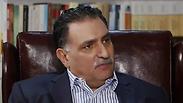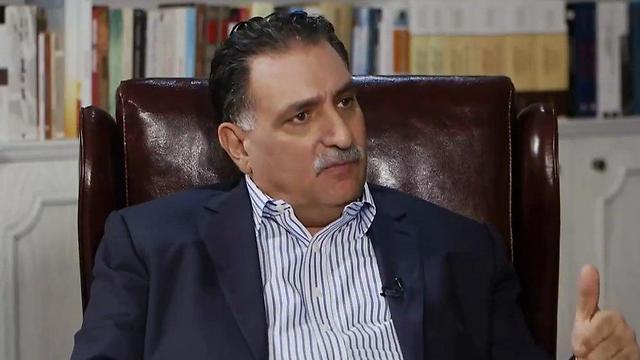

Former MK accused of spying speaks about allegations
Accused of spying for Hezbollah during the Second Lebanon War and faced with possible life imprisonment, Azmi Bishara fled Israel 10 years ago; in an interview held in Doha, the former Knesset member insists: 'I didn't discuss any security issues of any kind.'
Ten years after he fled the country over suspicions he spied for Hezbollah during the 2006 Second Lebanon War, former MK and Balad party chairman Azmi Bishara said he had met with Hezbollah leader Hassan Nasrallah several times after leaving Israel.
"I met with Hassan Nasrallah a few times after I left (Israel) in 2007. With that, I emphasize that the conversations (with Nasrallah) were not security related like Israel accuses, they were about political issues. I believe that any discussion in the matter is not going to help (elevate the suspicions)," Bishara, who now lives in Qatar's capital of Doha, told Qatari newspaper Al Arab in an interview.
"But you are a public figure and so is he," they interviewer pressed. Bishara responded that he was a public figure before, but not anymore, denying any conflict of interest.
Bishara told Al Arab that when he was under investigation in Israel ten years ago, he realized he was going to be accused of collaborating with the enemy, Hezbollah. "This is the gravest criminal charge in Israel. It is the only offense punishable by death, aside for genocide," said Bishara, clarifying that "since Israel doesn't practice the death penalty, it is converted to life imprisonment."
The former MK then told the interviewer that he didn't have a problem leaving the country, since the authorities didn't file a stay of exit order against him. That would require stripping his immunity as an MK, which didn't happen because investigators were reluctant to reveal information on the suspicions against him.
"They trusted I would return since I didn't know much about the investigation," said Bishara. "I flew out and took only two shirts with me, like I'm planning on coming back. At the time, I didn't fully decide yet on what to do, but after I left, Israeli news networks started reporting on the investigation. Information then reached me about their (the investigators') plans, and so I stayed abroad."
When asked how he got the information, Bishara said that it was mostly from MKs who got the information from other MKs, and from reporters who heard it first-hand from policemen who bragged about it to them.
The former MK claimed that even his family was not aware of his decision. He said that when the story broke out, he was with his family in Jordan's capital of Amman. They later returned to Israel, and he flew to Qatar for an interview with Al Jazeera.
He remembered that when he arrived there he met with the former Emir of Qatar, Sheikh Hamad bin Khalifa Al Thani, who has since been replaced by his son. "I told him that I may decide to stay here, and I explained what happened. We had a friendly relationship from a few years back." Bishara claimed that the Emir told him that "this country is your country."
He said that he was also welcomed in Syria and Jordan, and when he met Lebanon's former president Émile Lahoud, the president told him "stay with us."
Bishara accused Israel of wanting to get rid of him even before the suspicions arose against him, claiming that "some would say that I was one of the most successful MKs, as far as parliamentary work is concerned, but when they started talking about me like some kind of security risk, it was clear that they wanted to get rid of me."
Addressing the allegations he spied for Hezbollah, Bishara said that "my position was, as far as I saw it, for the resistance. I liked the model presented by the Lebanese resistance—they strived for accomplishments. They now call it 'a divine victory,' but as a logical non-religious person, I think that they wanted to accomplish something, and not just fight. They wanted to liberate Lebanon."
Bishara then added that "maybe they wanted more, as we later saw, to gain a position and status in Lebanon as a state. But for me, as a Palestinian who lived within the Green Line, I knew that Israel would not keep hold of South Lebanon like they do with the West Bank, and so understood that retreat is a viable option and that pressure (against Israel) helps. I believed their tactic was right."
However, he insisted, "I don't know secrets and I don’t share secrets with people. I was aware of my position as a member of the Knesset and a public representative and so I didn't discuss any security issues of any kind."
After that, Bishara said that his opinion changed. "The resistance was exploited for ethnic and religious gains. At the time, I believed that it was right to support the resistance, but my assessment changed. Today I'm against Hezbollah's presence in Lebanon and Syria. I took part in instilling the idea of resistance in the Arab culture and I believe that my decision to stand at Hezbollah's side while Arab countries were inciting against them was historic."
Bishara said that Hezbollah greatly appreciated his support of them. "At times, a man like me does as he pleases. When a man is driven by a political and national agenda that he ideologically believes in, his last consideration is of himself and his family," he said, clarifying that he does not advocate anyone to act like he did, but that he still believes that his support of Hezbollah produced more positive results than negative.
Today, Bishara serves as the General Director of the Arab Center for Research and Policy Studies and the Chair of the Board of Trustees of the Doha Institute for Graduate Studies.
(Translated & edited by Lior Mor)
















